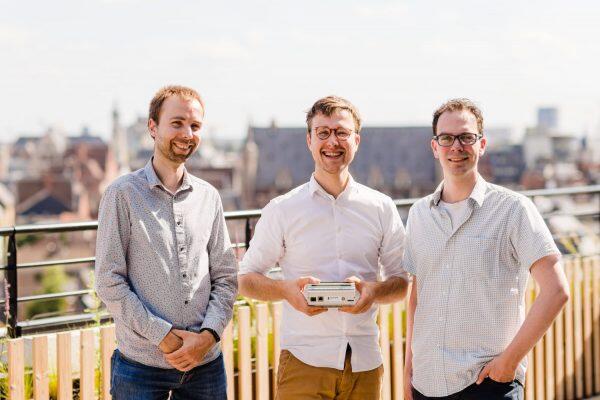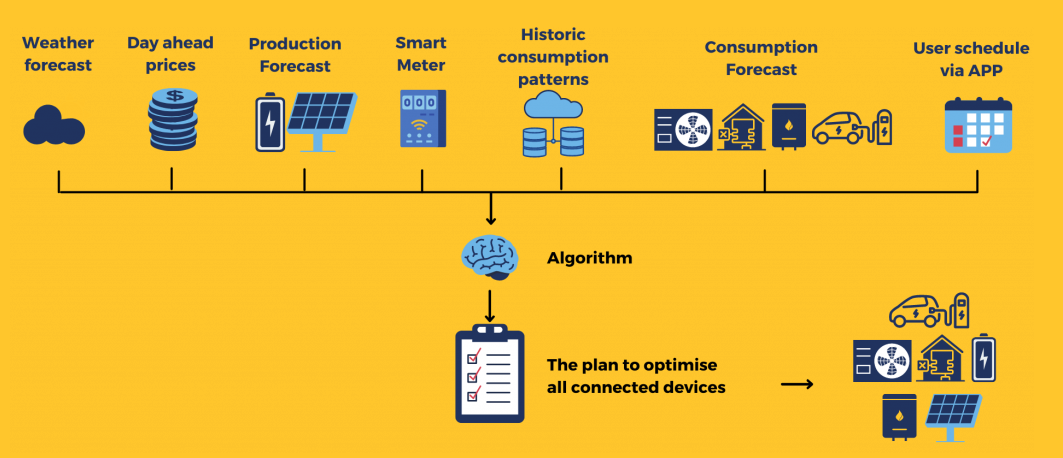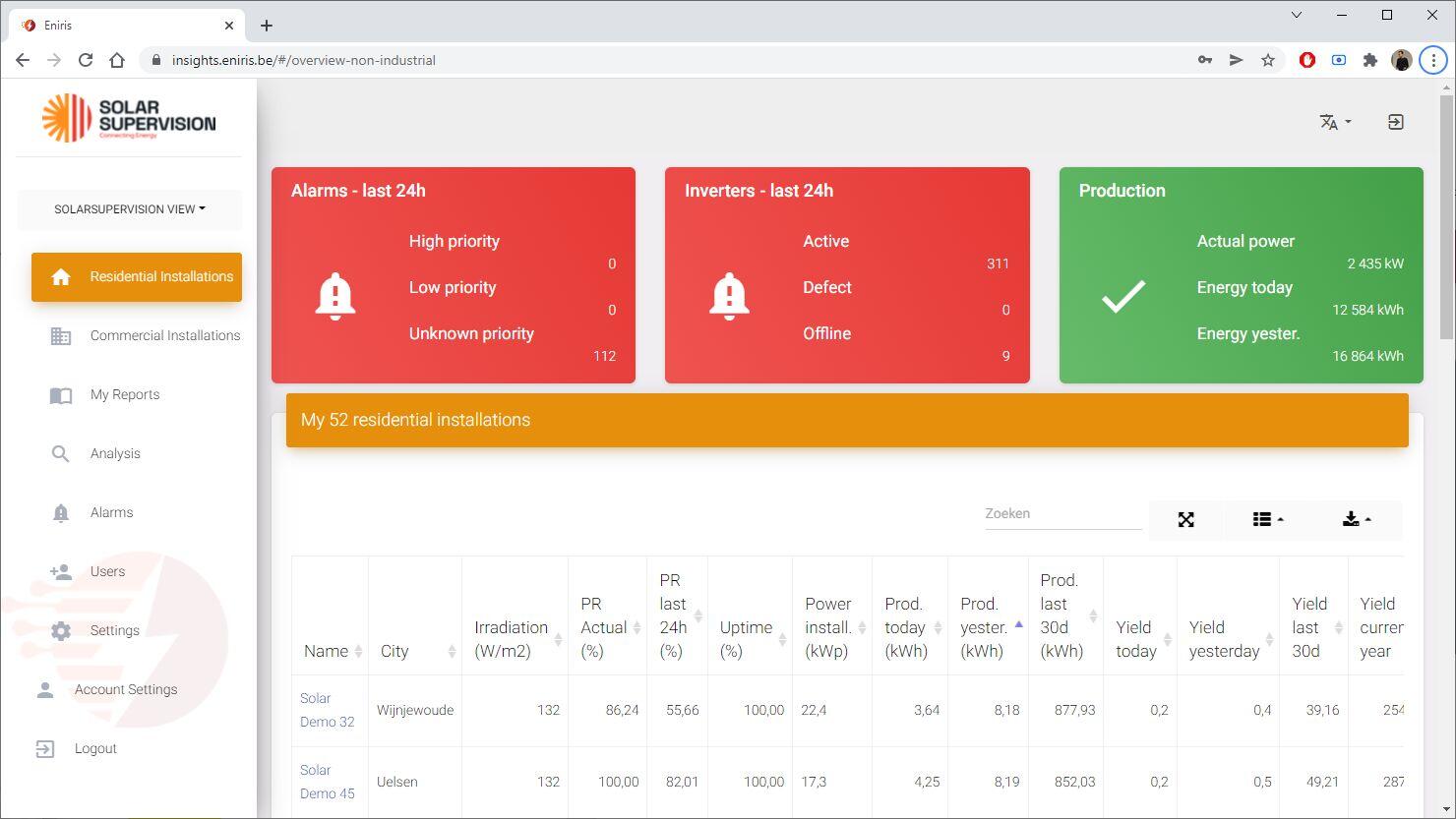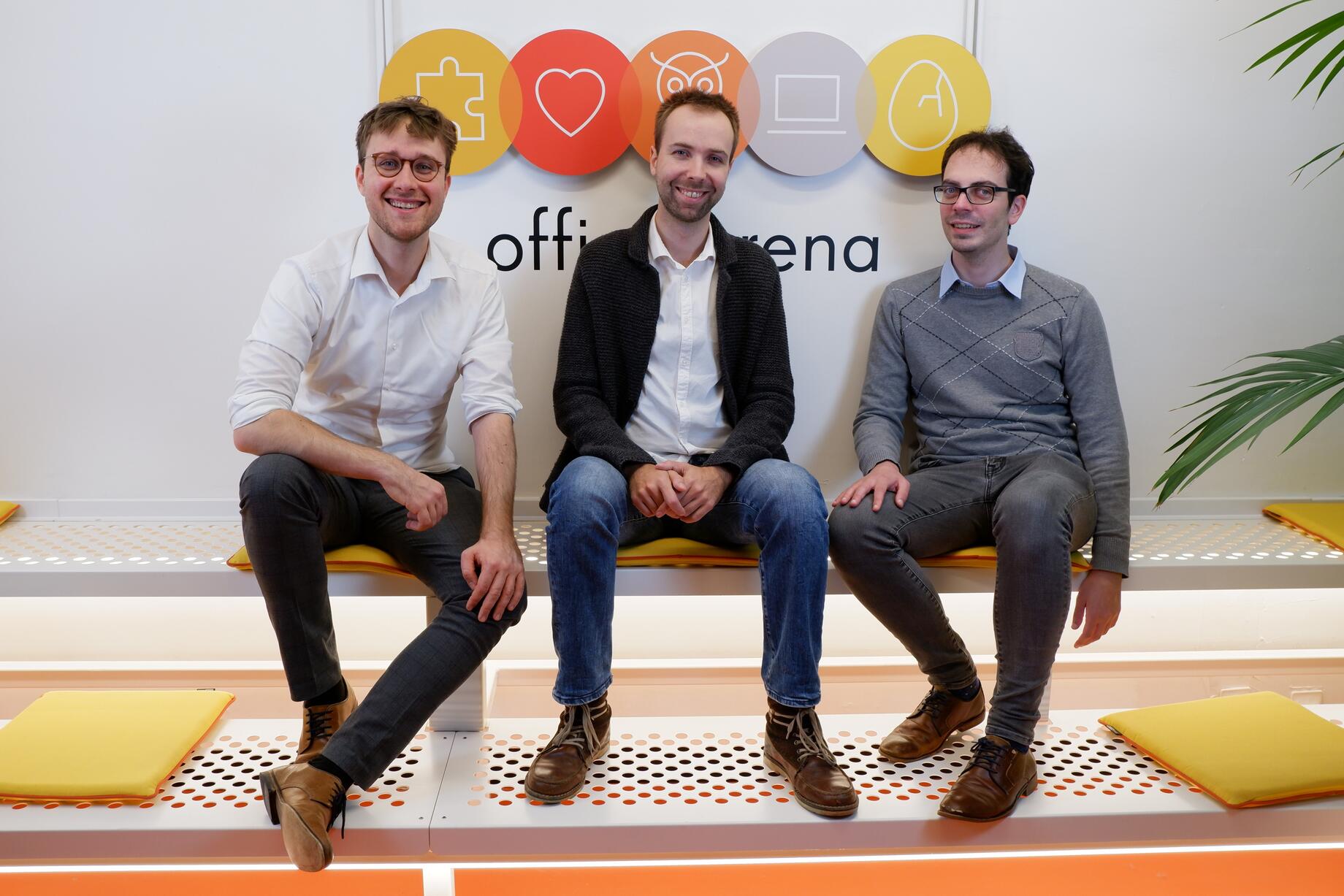Keep those energy meters in check thanks to Eniris and their spin-off Smartgrid One
Ever wondered what it’s like to run a cleantech-company in Ghent? Next to Eniris, these three men started another venture: Smartgrid One.
The software Eniris provides, allows you to measure the data from your solar panels, charging stations, heat pumps, energy meters and more. Now, two years after their official launch, they’ve added another business to their portfolio: Smartgrid One. To bring this controller to market, they can count on the support of the best European university accelerator imec.istart. “We simply can’t ignore it: the market and our customers are pushing us towards this next step,” says Wim Verheirstraten.
Their story is a perfect fit within our strategy to turn Ghent into a capital of technology. Within the cleantech-community, knowledge, technologies and materials are easily shared and innovation is maximised. That’s the only way to offer a solution to the social challenges we’re facing. This start-up is already offering a handle on matters. We spoke to Wim Verheirstraeten (on the left side) and Bart Verheecke (in the middle) about their future in Ghent.
Hello gentlemen, let’s go over your journey from the top: how did you start this venture?
Wim: “Very original: we knew each other from university (laughs). But after we graduated, everyone went their own way.”
Bart: “We kept in touch and then occasionally we went out to dinner together. During such a dinner, the idea started to mature a little bit further. Moreover, soon, it became clear that the three of us are an ideal mix: Wim and I with our background within the sector field and Pieter, who is very smart and quick to develop the software based on our input. That’s how we started monitoring. In the beginning, we even offered our software for free, in exchange for feedback. This allowed us to continue building a good product, fuelled by users’ experiences. It wasn’t until a year later, after we’d provided integrations for some 160 different systems, that we felt secure enough that the product was on point from a commercial point of view.”
Wim: “And then Bart mustered up all his courage and started calling people up (laughs).
Bart: “On our first official day, 5/08/2020, we converted our free customers to paying customers and then everything went very fast, because we were already so far along. If we fast-forward to two years later, we are now tracking around 43,000 installations. That’s 43,000 different points pushing data to our platform. That’s particularly fun to track (laughs).”
You started with Enirirs, now you’re adding on the SmartGrid Controller. Why start 2 companies side by side? Were you looking for an extra challenge?
Wim: “Because there is a huge potential growth in that controller, as the device adjusts energy consumption based on the availability and tariffs of wind, solar or the power grid. The question remains: how do we control the consumption of thousands of users? The grid congestion in the Netherlands isn’t an isolated issue. Pretty soon, we’ll be experiencing this as well. Consumers are almost forced to buy an electric car, which entails a huge investment. So, to do all of this sustainably, it’s necessary to align production and consumption. We see there’s a demand on the market and our clients are pushing us towards this next step.”
Bart: “We’ve approached the launch of the SmartGrid Controller similarly to how we’ve launched Eniris: first, we did extensive testing on our existing customers. And that turned out to be a smart move: those business cases ultimately convinced the jury at imec.istart to take us on board. We were able to show that the device could help you save about 30% when placed in a standard environment.”
-
Those business cases ultimately convinced the jury at imec.istart to take us on board. We were able to show that the device could help you save about 30% when placed in a standard environment.
Bart: “We now have two types of products: on the one hand, we’ve got the solar monitoring. This allows us to do international asset monitoring, tracking the performance of energy technologies. On the other hand, we’ve got the SmartGrid Controller. We can keep track of the data from anywhere in the world, making our business idea very scalable. But for the Smartgrid Controller, we’re tied to local legislations, which are different in every country.”
You’re talking about scalability, but how do you plan on doing that?
Bart: “Well, we’ve got a strong position in Belgium and the Netherlands, but we want to expand further in Germany. And that’s why the Innovative Starters support from VLAIO came in handy. To enter that market, you also need expertise within that market. Our business model is set up so that we work with distributors for our SmartGrid Controller and with representatives for the other asset management. We’ve had to split those operations, because every country has its specific knowledge regarding legislation, infrastructure, etc. Let me share an example from a Dutch customer of ours. He has a bottleneck in his organisation: everyone in their country wants to become more sustainable, but their energy grid can’t handle it. In the Netherlands, they’re really reaching the limits of what’s possible.”
Wim: “And in Germany, the regulators of the power grid have to supervise the installations of the consumers. They can even intervene if you produce too much energy. Thanks to this support from VLAIO, we can start experimenting to figure out the best way to approach the German market. We’ve got a pretty good idea of how to do that, but we need to make it more of a concrete plan.”
That’s why you’re also looking at imec.istart’s accelerator programme?
Bart: “Yes, and for the resources and the network they have access to.”
Wim: “Absolutely! And the workshops they provide, offer crucial insights for every sort of entrepreneur.”
Bart: “They’ve been helping us to fine-tune our business model, in order to become very scalable. That proves to be the biggest challenge within any company: making sure you make the right choices and don’t survive on a few Belgian SMEs as customers within five years. No, we really want to build a global network. And I think we’ve got a great momentum now, with the current economic climate: legislations are changing, having access to all of these different energy technologies and legacy devices out there, etc. We find ourselves at a very interesting crossroads (laughs).”
“And I think that everyone benefits from an improved synchronisation of devices. For example: you’ve got an electric car on your driveway and solar panels on your roof. As a consumer, you want the surplus energy from your roof to go to your car, right?”
Wim: “We’re not even talking about retaining the extra power from your car. A lot of cars are already equipped for that, but legislation doesn’t provide a framework for it, yet.”
Bart: “We’re convinced that will follow, in the near future. The most important step now is to try to fine-tune self-consumption. Besides, consumers are smart enough to start looking for alternatives on the market. And, as a side note, did you ever think about the fact that maybe we just haven’t been paying the right price for our energy? Food for thought, right? Don’t get me wrong, I don’t like paying my bills either, but I still think our energy was way too cheap for all these years. There has been some poor decision-making in the past, which we’re paying back now.”
What sort of contribution can you make, to make this energy crisis more bearable for consumers?
Bart: “In the current economic climate, our customers are looking at us to solve their issues. The fact that the electricity bill will be based on peak consumption as of next year, also encourages consumers to map their consumption. With energy prices reaching heights we’ve never seen before, we’ve noticed that more and more consumers are taking matters into their own hands, looking for ways to reduce these costs.”
Wim: “What we’re offering, pays for itself within 2 years’ time. One of our objectives is also to reduce peak consumption by 40 percent, which can only benefit consumers.”
-
Did you ever think about the fact that maybe we just haven’t been paying the right price for our energy? Food for thought, right?
Now, a start-up sounds hip and exciting, but it’s still hard work, to build it into a successful business. What targets have you set for yourselves and these companies?
Wim: “Evidently, we’ve set targets for what we want to sell within a certain period of time.”
Bart: “But we’re also looking for investors. However, that’s not easy: we want to make sure there’s a right fit, that they can open doors for us and help us further in our path of international growth.”
In that growth, what’s holding you back, do you think?
Bart: “It took us quite some time and effort to get our software on point. We had to do a lot of customisation in the beginning. However, that did lead to a great advantage: we’d gained so many insights into the systems of grid managers, producers, etc., that we were able to offer them more and use those new insights for other purposes. Now, we’ve ensured a way for as many people as possible to use and benefit from our systems.”
Wim: “Finding the right colleagues is not easy as well. But fortunately, over time, we were able to put a fantastic team of people together.”
Entrepreneurship, it’s a rollercoaster! Apart from those pitfalls, what are your highlights?
Bart: “Being selected by imec.istart!”
Wim: “Getting that grant from VLAIO! No, not only that. Every new client counts as well!”
Bart: “Yes, putting 4,000 private installations onto our platform for one customer over the past summer was really thrilling! And it’s also pretty cool to see all those dots (laughs).
-
We had to do a lot of customisation in the beginning. However, that did lead to a great advantage: we’d gained so many insights into the systems of grid managers, producers, etc., that we were able to offer them more and use those new insights for other purposes.
Finally, what’s your ultimate tip for entrepreneurs in Ghent?
Bart: “Gosh, ultimate… Sounds like we’ve found the holy grail, which is not the case, of course. When I think about it, what I sometimes see with competing companies, is that they settle for a certain number of customers from Belgium and then settle for a local expansion. They train their own technicians who, in their turn, visit their customers. We don’t want to do that. We want to be a tech company, without installing the devices.”
Wim: “Exactly, we mainly work through installers. That wheel already exists, we don’t need to invent it (laughs). It’s more like: stick to what you know and do best. We are engineers, all three of us, let’s provide the technique.”
Bart: “Moreover: dare to seize the momentum! We could have waited and seen how this energy transition pans out. Instead, we chose to actively participate in it. Do we have any answers to everything we should be doing? By no means (laughs), but we’ll just go with the flow.
Wim: “Indeed, don’t overthink it and stop tinkering with your product. It’s fine as it is, just try to bring it to market. However, there is a setback to this: there is nothing more painful than having to admit to a customer that the product isn’t perfect yet. But then you have to keep convincing them that it’s a work in progress and that you’ll keep testing and adjusting along the way. Your product will get better with more and better results. Besides, if there is no market for your product, it’s better to establish that in the beginning of your journey, rather than at the end of a 4-year endeavour (laughs)! Choose for co-creation with your customer, ensuring a product that’s equipped for every need the customer has. It will save you a lot of headaches, I can assure you!”
Bart: “Above all: surround yourself with the right people. We’ve started this project with three people, and we’re extremely supportive of each other.”
Discover Invest in Ghent
Eager to start a business in Ghent, just like Wim, Bart and Pieter? The team Invest in Ghent is ready to help you start or scale your business in Ghent through our expert local guidance and introduction, so your business can grow even further.



